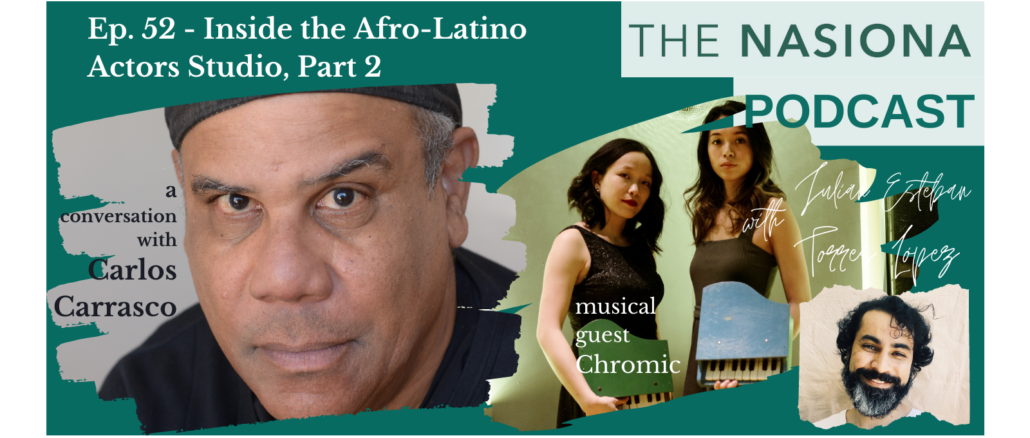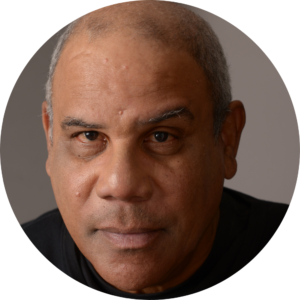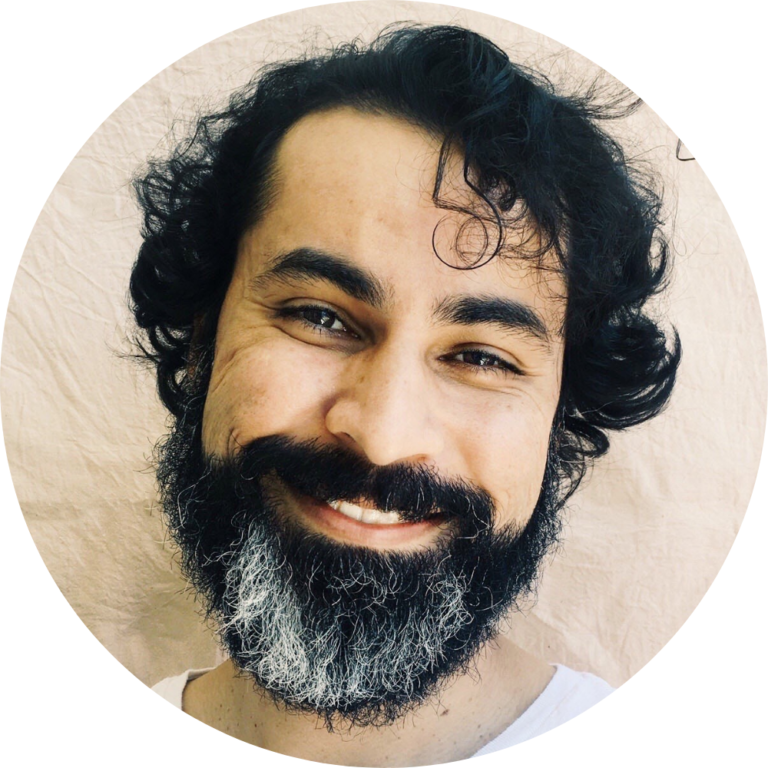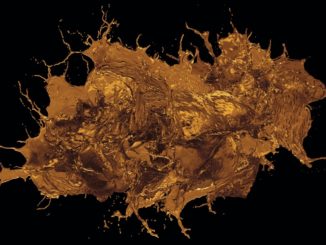
Listen to our 2-part conversation with Carlos Carrasco on The Nasiona Podcast‘s episode 50 “Inside the Afro-Latino Actors Studio, Part 1” and episode 52 “‘Inside the Afro-Latino Actors Studio, Part 2.”
You can also find our podcast episodes on Apple Podcasts, Spotify, iHeartRadio, Stitcher, or wherever you get your podcasts.
Inside the Afro-Latino Actors Studio, Part 2
On today’s episode, we re-enter the Afro-Latino Actors Studio with Carlos Carrasco: actor, filmmaker, and director of the Panamanian International Film Festival. Last week, in part 1 of our conversation, Mr. Carrasco took the lead on stage, then gave us the VIP tour backstage, behind the curtains, where we glimpsed into what it is like to be an immigrant Afro-Latino in acting in the United States, and how this experience impacted his identity and drove him to also dedicate his time to social impact causes for Latin actors, theatre, and film. In today’s conversation, we examine the heart of art, how the sounds of things carry the emotions of things, we deconstruct language into its most fundamental pieces, and explore how art is a process of selection.

Born in Panamá City, Panamá, Carlos Carrasco has appeared as an actor on Broadway and Off Broadway in New York City, as well as appearing at many of the country’s regional theaters. He appeared on Broadway in the Circle-In-The-Square’s production of “The National Health” and has appeared at The Hartford Stage Co., Shakespeare & Co., Atlanta’s Alliance Theatre, The Arizona Theatre Co., The Folger Theatre and The American Shakespeare Theatre. Off- Broadway he appeared with The Puerto Rican Traveling Theatre, INTAR, Theatre for a New Audience and The New York Shakespeare Festival.
Mr. Carrasco has co-starred in such feature films as “Speed,” “Blood In…Blood Out,” “Turnover,” “Parker,” ”One Man’s Hero,” “The Burning Season” and “The Fisher King.” On television he has been a guest on many prime time series, including “Insecure,” “CSI,” “Star Trek: Deep Space 9,” ” ER,” “Seaquest,” “Hunter,” “The Equalizer” and the made for television movies “As Good As Dead” and “Have You Seen My Son?”.
Mr. Carrasco has been active in the non-profit sector, serving for six years as Executive Director of the Hispanic Organization of Latin Actors, serving for three years on the Theatre panel for the New York State Council on the Arts and currently producing a Latin American film festival, The Panamanian International Film Festival, now entering its seventh season.
As filmmaker, Mr. Carrasco has produced and directed five short films, from the documentary “Art Galleries and Back Alleys,” celebrating the East Los Angeles Artists Collaborative Self-Help Graphics to the more recent “One” and “Disarm” tackling the difficult issues of police and school shootings.
I had the honor of speaking with Carlos Carrasco on the 29th of August, 2020. This is the second part of our two-part conversation.
But before we jump into the conversation with Mr. Carrasco, Aïcha Martine Thiam and I would like to introduce you to The Nasiona BIPOC Music Series. We will begin most podcast episodes this year by showcasing a BIPOC musical artist from our series, which you can explore at TheNasiona.com. Today’s musical guest is Chromic, and they perform their track “Lightless,” which you can find in The Nasiona‘s compilation BIPOC musical album, Volume 1: Petrichor.
Want to be considered for our BIPOC Music Series? Go here to learn more.
A fiery, dynamic duo that pushes the possibilities of genre and performance, Chromic experiments with different textures of toy pianos, prepared pianos, electronics, and everyday objects to create playful sound worlds that spark excitement and curiosity to audiences of all ages. With their unique instrumentation and approach, they bring new audiences together by crafting innovative experiences that integrate music with multimedia, electronics, and improvisation, and commissioning new works by composers and interdisciplinary artists that are transposable through digital and physical spaces.
Julián Esteban Torres López (he/him/his/él) is a bilingual, Colombia-born culture architect with Afro-Euro-Indigenous roots. For two decades, Julián has worked toward humanizing those Othered by oppressive systems and dominant cultures. He is the creator of the social justice storytelling movement The Nasiona, where he also hosts and produces The Nasiona Podcast. He’s a Pushcart Prize and Best Small Fictions nominee, a Trilogy Award in Short Fiction finalist, and the author of Marx’s Humanism and Its Limits and Reporting On Colombia. His poetry collection, Ninety-Two Surgically Enhanced Mannequins, is available now. His work appears in PANK Magazine, Into the Void Magazine, The Acentos Review, Novus Literary and Arts Journal, Havic 2021: Inside Brilliance, among others. Julián holds a bachelor’s in philosophy and in communication and a master’s in justice studies from the University of New Hampshire and was a Ph.D. candidate at the University of British Columbia Okanagan, where he focused on political science and Latin American studies.
The Nasiona Podcast amplifies the voices and experiences of the marginalized, undervalued, overlooked, silenced, and forgotten, as well as gives you a glimpse into Othered worlds. We focus on stories that explore the spectrum of human experiences—stories based on facts, truth-seeking, human concerns, real events, and real people, with a personal touch. From liminal lives to the marginalized, and everything in between, we believe that the subjective can offer its own reality and reveal truths some facts can’t discover. Hosted, edited, and produced by Julián Esteban Torres López.
Please follow The Nasiona on Twitter, Instagram, and Facebook for regular updates: @TheNasiona
Thank you to Aïcha Martine Thiam for co-producing the BIPOC Music Series component of the episode, and to Chromic for being our musical guest.
Original music for The Nasiona Podcast was produced by the Grammy Award-winning team of Joe Sparkman and Marcus Allen, aka The Heavyweights.
Joe Sparkman: Twitter + Instagram. Marcus Allen: Twitter + Instagram.The Nasiona Magazine and Podcast depend on voluntary contributions from readers and listeners like you. We hope the value of our work to our community is worth your patronage. If you like what we do, please show this by liking, rating, and reviewing us; buying or recommending our books; and by financially supporting our work either through The Nasiona’s Patreon page or through Julián Esteban Torres López‘s Ko-fi donation platform. Every little bit helps.
Thank you for listening and reading, and thank you for your support.





1 Trackback / Pingback
Comments are closed.